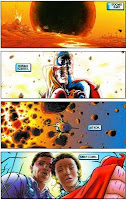 motivations don't often make much sense). But I still watch it. I find Tom Welling's performance fun, even though his line readings sometimes sound like he's phonetically repeating words in a language that he doesn't understand. Allison Mack is quite affecting, especially when she doesn't have to heroically power through embarrassing Whedon-esque verbal tics. I also really liked how, this past season, they made the Clark/Lex homoeroticism blatant by making Lex a woman and having her flirt with Clark mercilessly (yeah, I know, she wasn't literally Lex Luther...but come on). I thought that Crashdown from Battlstar Galactica was good as Doomsday, and Erica Durance is probably the most appealing Lois I've seen in live action (though that is damning with faint praise). I know that the show is a mess, but I like Superman and I like the cast, and I like what the show is trying to do.
motivations don't often make much sense). But I still watch it. I find Tom Welling's performance fun, even though his line readings sometimes sound like he's phonetically repeating words in a language that he doesn't understand. Allison Mack is quite affecting, especially when she doesn't have to heroically power through embarrassing Whedon-esque verbal tics. I also really liked how, this past season, they made the Clark/Lex homoeroticism blatant by making Lex a woman and having her flirt with Clark mercilessly (yeah, I know, she wasn't literally Lex Luther...but come on). I thought that Crashdown from Battlstar Galactica was good as Doomsday, and Erica Durance is probably the most appealing Lois I've seen in live action (though that is damning with faint praise). I know that the show is a mess, but I like Superman and I like the cast, and I like what the show is trying to do. And what I think the show is trying to do isn't the Portrait of the Superhero as a Young Man. I think that Smallville is a really long reflection on how to tell a Superman story.

The whole show seems to be building to a particular, and iconic, final shot: Welling tearing open his dress shirt in a phone booth revealing the red and yellow 'S' on blue tights. And they've made it pretty clear that he's not going to be Superman until the very end. Everything before the end, as Jacob said on Lost a couple nights ago, is progress.
Smallville is one of those shows that really tries to push the whole "it's not the destination, it's the journey" thing. As much as we all want to see that final shot, is it alone really worth nine or ten seasons of TV, maybe 200 episodes? If you're just watching Smallville for the money shot, you're wasting your time. And the writers seem are almost sarcastic about it: all the characters speak about destiny with such single-mindedness that it's hard to ignore. Everything was destiny this season. Clark is supposed to kill Chloe/Brainiac, or else. Why? It's destiny. Whoops, Clark was actually supposed to save Chloe from Brainiac. Except by doing that he saved Doomsday, which means that he has to kill Doomsday...unless saving Doomsday is his destiny...unless it isn't and humanity is a bunch of overly-emotional weaklings just waiting for their turn on Oprah. The season ends all this muddled prognostication with Clark deciding that he needs to let go of his human emotions and be the Red/Blue Blur all the time (couldn't he at least be "the Blur"? I don't think any superhero has had a worse alias. Even the Badger, or the Spectacular Spider-Ham. It's either karma because, eventually, he gets the best superhero name ever or it's the secret ID equivalent of working in the mailroom).
But, come on. This is just a dodge so that the show can keep going. The viewers know that. Even I know it, and I only accidentally tune in every week. We don't have to worry about destiny, because we already know what the outcome is but the show can't give us the mild-mannered reporter/tights-wearing superhero yet, so they need to provide him with a motivation delay that transformation. I see these delay tactics not simply as an exercise to prolong the CW's cash cow (though that is, certainly, a big reason), but to experiment with alternate permutations of the Clark/Superman character. Part of me, the mean part, likens it to all the bad ideas that get thrown out while writing of something good...or all three Star Wars prequels. You know, the crap that wasn't good enough to make it into the real story but that the writer(s) needed to know in order to tell the good stuff. The more reflective part thinks otherwise.
The writers in Smallville are muddling through, in their own particular way, the process of figuring out who Superman is and what makes him great. All the detours and twists and random encounters and plot contrivances are trying to explore a different facet of what makes Superman. Every writer has to do that in order to tell a story. They're trying to find what works, find what motivations make sense. For all its clumsiness, with Clark abandoning his civilian identity to be the Blur (I can't call him that other thing...I just can't), the writers are trying to lead into a story about why he needs to be Clark. Sure, it will probably make little emotional or logical sense, but, seriously, most Superman stories don't either. Superman is so difficult to keep writing stories about because he's done so much, he's fought Lex Luther so many times, he's tricked Lois and Lana and Jimmy and all the rest so many times that it's hard

to come up with something new. It is really hard to tell a Superman story. On a basic level, the fun is the moral rectitude, the cool costume, the great powers, the ridiculous contortions needed to re-establish the status-quo, the triangle between Clark Kent and Kal-El and Superman. These things, the things Morrison highlights so efficiently in the first page of All-Star Superman #1 [left], are the necessary ingredients in a good Superman story, but the combination is the tricky part. Smallville isn't "good," and it only rarely shows even a hint of ambition, but that's OK with me. Watching Smallville is like listening to friends trying to explain the appeal of Timothy Dalton as James Bond, or the merits of Dollhouse (and good luck with that one): it's a rambling, usually incoherent expression of fandom and love for a make-believe character or universe. And that's fine with me.
Of course, I would love to see Tom Welling play a scene where he gets drunk, splits into two different people, who fight, and then saves Richard Pryor from ski-jumping off a sky-scraper. What do I know?


No comments:
Post a Comment